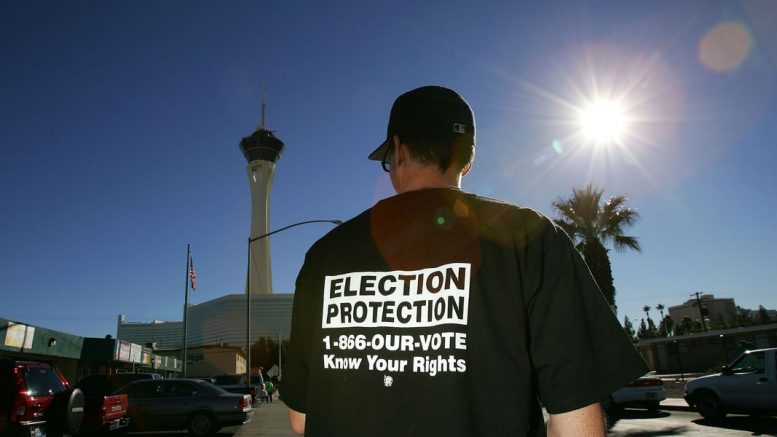The Democratic National Committee is accusing the Republican Party of coordinating to intimidate voters. And it’s taking the GOP to court.
The DNC filed a lawsuit against the Republican National Committee on Wednesday night , alleging that the GOP was violating a 34-year-old court order that bars the RNC from using “voter fraud” as an excuse to suppress votes.
The Trump campaign is certainly encouraging “monitoring” in the name of “ballot security” — something more likely to suppress voters than prevent fraud. Plenty of state parties are helping out the campaign. But the Republican National Committee itself has actually been trying to steer clear of this sort of activity, exactly because it didn’t want to violate the federal court order.
The RNC was only a year away from being freed of judicial oversight over its poll-watching activities — and it was looking forward to being free to go after the “fraud” it’s been arguing for years is widespread. Now the overeagerness (and perhaps clumsiness) of its candidate’s efforts threatens to set it back for several years to come.
The RNC has been under federal monitoring since it sent a “Ballot Security Task Force” to minority neighborhoods in 1981
Voter intimidation is straightforwardly illegal under federal law. But what constitutes voter intimidation — and what the line is between intimidation and fraud prevention — isn’t always clear.
But the RNC isn’t just bound by the law against voter intimidation. It’s bound by a federal consent decree, which lists particular kinds of activities the national party cannot engage in if it wants to stay on the right side of the law.
The consent decree dates back to 1982, in the aftermath of the 1981 election in New Jersey. Facing a close governor’s race, the RNC and New Jersey Republican Party recruited volunteers (including off-duty law enforcement officers) to serve on a “National Ballot Security Task Force.”
The task force — wearing armbands and, in some cases, holstered guns — patrolled outside several polling places (which, according to Democrats, were all in predominantly black and Latino neighborhoods) on Election Day.
The lawsuit filed by Democrats (which led to the consent decree) accused the task force of:
disrupting the operations of polling places, harassing poll workers, stopping and questioning prospective voters, refusing to permit prospective voters to enter the polling places, ripping down signs of one of the candidates, and forcibly restraining poll workers from assisting, as permitted by state law, voters to cast their ballots.
One voter testified to being physically pulled from a polling place by a task force member. Others testified that task force members had confronted them outside the polling place and asked them to show voter registration cards — and then turned them away when they didn’t comply.
The Republicans ultimately won the gubernatorial election — by a close enough margin that it’s not clear they would have won if the task force hadn’t been in effect. At the time, though, the victory of Republican nominee Thomas Kean was attributed to the genius of a young political strategist named Roger Stone. Tom Kean (far right) would later become a political ally of this guy next to him! Recognize him? Sonia Moskowitz/Getty
But the task force’s ultimate cost for Republicans was steep. In 1982, Democrats sued the RNC, the New Jersey Republican Party, and three of the people involved with the task force project. (There was no evidence that the gubernatorial campaign, including Stone, was involved with the task force.)
Ultimately, the DNC, RNC and a federal judge signed a consent decree prohibiting the RNC and the other defendants from aggressive “ballot monitoring” tactics. The version of the decree in effect today (which has been revised a few times over the decades) prevents the RNC from engaging in “any program aimed at combating voter fraud by preventing potential voters from registering to vote or casting a ballot,” including “the use of challengers to confront potential voters and verify their identities.” (“Normal poll watching,” on the other hand, is okay.)
Republicans have started to chafe under the consent decree — especially as their party has promoted the message that voter fraud is a substantial problem in America. The party tried to get it lifted in 2009 — only to end up having it extended another eight years. The current decree is set to expire in 2017, and Republicans, according to a former GOP election lawyer , are “eager to have it come off next year.”
The Trump campaign and allies are planning aggressive “ballot monitoring”
The consent decree does not, however, apply to Donald Trump or his presidential campaign. Nor does it apply to independent groups supporting Trump, or to state parties (outside of New Jersey). And all of those groups are more than happily planning to engage in some of the tactics that got the RNC smacked with a consent decree back in the ’80s.
Trump has fanned fears not only of widespread voter fraud — especially in “certain areas” of the US (specifically, “inner cities” ) — but of an outright rigged election . At the same time, though, he’s told his followers that they have the power to protect the integrity of the American ballot — by going to polling places where they think fraud is likely and making sure that “everything is on the up and up.”
Some followers plan to do this entrepreneurially, to “go right up behind” voters who look like they might not be US citizens. But the campaign also appears to be organizing official “Trump Election Observers” — or at least it’s asking for volunteers for such a position on its website. Screenshot via Trump/Pence campaign website
Trump ally Roger Stone — who isn’t bound by the RNC’s consent decree despite his involvement with the election that sparked it (because he wasn’t involved in the task force’s work) — is going even further. His group, Vote Protectors, recruited volunteers to conduct “exit polls” of voters in nine cities: Fort Lauderdale, Florida; Detroit; Charlotte and Fayetteville, North Carolina; Las Vegas; Cleveland; Philadelphia; Richmond, Virginia; and Milwaukee. All of these are in swing states (or at least potential swing states), and all have large nonwhite populations.
Obviously, a volunteer-taken “exit poll” is questionable. And the Vote Protectors site didn’t have information about how to take polls — but it did have a page to generate official-looking ID badges and a lot of information about how to upload videos of voters to the internet. (After the Huffington Post asked Stone about the site , these pages were taken down, ostensibly at Stone’s request.)
Stone wasn’t involved in the actions that brought the consent decree down on the RNC, but he’s certainly eager to get revenge on it. In certain parts of the conservative internet particularly concerned about voter fraud, a (somewhat garbled) description of the consent decree has become a bit of right-wing copypasta — intended to spread the word about how Republicans “agreed” not to raise any alarms about Democratic fraud.
Stone himself brought up the consent decree, and the likelihood that Democrats would use it to stop the Trump campaign, in an interview with Alex Jones back in September . (He proceeded to say that if the consent decree didn’t stop Trump, Democrats might resort to assassination.) He and a lot of conservatives very much appear to feel it’s prevented them from revealing the truth about widespread voter fraud — and they definitely want to see it go.
The DNC is alleging that the RNC is supporting Trump’s voter suppression efforts
Some of these activities, if the RNC were the ones doing them, would probably violate the consent decree — or would at least require the RNC to check with the federal judge to make sure they weren’t violations. But the RNC isn’t officially involved with them.
Indeed, the RNC has been extremely anxious not to get involved with election monitoring efforts in any public way. Last week, according to Byron Tau of the Wall Street Journal , the RNC’s general counsel sent a memo to committee members reminding them not to engage in any monitoring activity as part of their RNC work.
Since a lot of committee members are also leaders in their state parties, the RNC couldn’t outright ban them from participating in any monitoring work at all — but it tried. “You are encouraged not to engage in ‘ballot security’ activities even in your personal, state party or campaign capacity. If you elect to do so, please be aware that the RNC in no way sanctions your activity,” the memo said.
The DNC, however, claims there’s evidence that the Trump campaign’s “monitoring” activities (and those of state parties) really are being coordinated with the RNC. That’s the claim at the heart of its lawsuit.
The DNC is making two different arguments. One is that the Trump campaign has admitted that it’s working with the RNC to prevent voter fraud; the other is that the Trump campaign, state parties, and RNC are so closely interwoven at this point that it’s impossible to separate the RNC from the election monitoring work being done on the party’s behalf. When a pro-Romney group put up these posters in black neighborhoods in Cincinnati in 2012, the RNC wasn’t involved. But in 2016, the lines are fuzzier. Mitch Potter/The Toronto Star via Getty
The first claim is a little thin. In August, Trump running mate Mike Pence told a town hall crowd that “the Trump campaign and the Republican National Committee are working closely with state governments and secretaries of states all over the country to ensure ballot integrity.” In October, Trump campaign manager Kellyanne Conway went further: She told the Washington Post’s Robert Costa that the campaign was “actively working with the national committee, the official party, and campaign lawyers to monitor precincts around the country.” Conway, however, proceeded to tell Costa she was mistaken — something the DNC lawsuit doesn’t mention.
The second claim is harder to refute. The DNC certainly presents evidence that state Republican parties in states like Ohio are coordinating with the Trump campaign on election observation efforts (as well as sharing space and helping with recruitment). And as the DNC points out, both state parties and the Trump campaign are relying in large part on the party infrastructure provided by the RNC.
”The RNC has commingled its staff and resources with the Trump campaign in a manner that makes it impossible to separate one’s allocated resources from the other’s in the field,” the complaint says.
The DNC wants the RNC to immediately defund (and demand reimbursement for) any election monitoring efforts that happened with RNC resources. That’s a difficult demand to grant if the funds are all as commingled as the DNC says. But the biggest part of the new lawsuit is much clearer: The DNC thinks that the RNC’s purported coordination with Trump is sufficient reason for the federal judge to keep the consent decree in effect for eight more years, until 2025.
The Republican Party is in an untenable position when it comes to voter fraud
Ironically, the RNC has only stepped up its coordination efforts because the Trump campaign appears less interested in getting its voters to the polls than in keeping other voters away. Faced with a more conventional candidate, the party could have kept itself at arm’s length from the candidate’s field operation — and therefore from any problematic voter suppression tactics.
Then again, a more conventional candidate probably wouldn’t be endorsing the aggressive “monitoring” tactics Trump is pushing anyway. A more conventional candidate would probably care enough about the RNC to make sure it didn’t end up getting ensnared in a consent decree violation; Donald Trump, by all appearances, couldn’t care less.
But it’s not entirely Trump’s fault that he’s crossed a line in the sand. The Republican Party has gotten itself in a bind: For the past several years, it’s hyped up a problem for which it is legally prohibited from proposing a solution.
The Republican Party has been raising alarms about voter fraud for years . It’s passed state laws to open the polls for less time and with higher eligibility barriers; it’s successfully challenged parts of the federal Voting Rights Act that used to provide a check on such laws.
But the party hasn’t been able to empower its voters to do anything about the problem themselves. Furthermore, the party can’t even reassure voters that it’s working with everyone else in the system to make sure the votes are counted the right way — that’s exactly the sort of comment that the DNC’s using to justify its lawsuit.
The Republican Party has no way to assuage the concerns it’s fanned in its voters. It appears now that it has two options: Allow its voters to continue to doubt the legitimacy of the election, or break a federal court order to help its voters feel that the law is being upheld.
Source: www.vox.com




